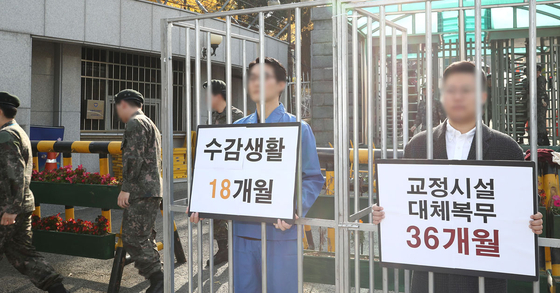
A soldier is passing by a prison performance held during a press conference in front of the Ministry of Defense in Yongsan-gu, Seoul in 2018, “The government opposes the conscientious objection of conscientious objection to alternative service”. yunhap news
How can the’real conscience’ for conscientious objectors be measured? In this regard, the criteria can be assessed in three different judgments issued by the Supreme Court on the 25th.
Three mixed judgments on the same day as conscientious objection
The first and third divisions of the Supreme Court (Chief Judge Park Jeong-hwa and Min Yoo-sook, Supreme Court Justices) confirmed the court cases that convicted Mr. A and Mr. B, who were charged with violating the Military Service Act, for refusing to join the military for reasons of conscience, respectively.
Only the claim of “nonviolence and peaceism”… “Simple military culture can not be halved”
![The view of the Supreme Court. [뉴스1]](https://i0.wp.com/pds.joins.com/news/component/htmlphoto_mmdata/202102/25/602f8117-de67-465c-9597-7e949c9fd69f.jpg?w=560&ssl=1)
The view of the Supreme Court. [뉴스1]
First, Mr. A refused to enlist in accordance with a non-violent and pacifist conscience, saying, “I cannot hold a gun for war,” and was handed over to trial.
However, the first and second trials said, “The refusal of military service that Mr. A argues is mainly due to antipathy against the authoritative military culture rather than pacifism.” It is difficult to see it as a conscientious objection to military service.” In addition, there was no specific content of Mr. A’s activities in the anti-war and peace field before refusing to serve in the military.
Mr. B, who refused to enter the military service, saying, “It is impossible to enter the military organization that expands and reproduces violence for the spread of peace,” was not recognized as a conscientious objector of military service because of’disagreement in words and actions.
“The police officer said that they refused to be assaulted…
“Mr. B has a history of criminal punishment for assaulting a police officer who participated in a rally and carried out order maintenance tasks,” said the court. “Rather than being opposed to all wars and forces, the purpose, motive, and situation Depending on the situation, violence can be justified, and in some cases, he has the idea that he can participate,” he judged as a violation of the Military Service Act.
The Supreme Court saw that in both cases, “the centrifugal judgment is correct.” On the 25th, the Supreme Court said, “In case of refusal to perform military service based on’real conscience’, it may be admitted that, not only because of religious beliefs, but also because of conscientious decisions of ethical, moral, philosophical or similar motives. Revealed.
However, in the case of Mr. A and Mr. B, he said, “It is difficult to say that the true conscience and conviction set by the Supreme Court are deep, firm, and sincere.”
On the other hand, in another case of refusing military service for non-religious reasons, the first part of the Supreme Court (Presiding Judge Lee Heung-gu) judged that “a conscientious objector is correct.” In this case, the defendant refused to convene the reserve army after enlisting in the military, and the judgment of the lower court was accepted, saying, “It can be seen that the defendant maintained his beliefs while enduring the investigation, trial, and economic difficulties caused by the refusal to convene the reserve army.”
These different judgments on conscientious objectors of military service are interpreted to mean that the case will judge the case-by-case’true conscience’, which is the standard set by the court.
In the first case of the Supreme Court’s conscientious objection to military service in 2018, it was based on the criterion that “indirect facts related to conscience or circumstantial facts must be proved”. However, in the case of conscientious objection to military service, which is not for religious reasons, the court’s judgment may be mixed for each case, and controversy is expected to continue for the time being.
Reporter Lee Yoo-jung [email protected]
![]()
